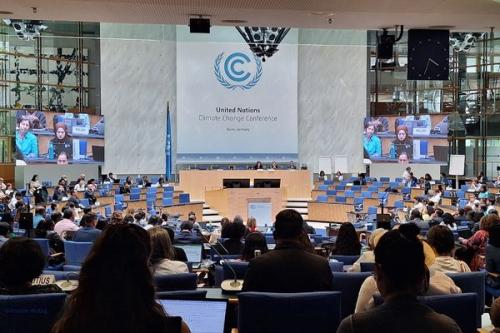
https://unfccc.int/sb62/observer-updates
Web coverage and daily reports of the June Climate Meetings (SB 62) by UNFCCC Observers
The following organizations provide daily web coverage, reports as well as summary and analysis of SB 62 meetings on their web pages:
ECO (by CAN)
ENB (by IISD)
TWN (by TWN
Adaptation will be a key focus of discussions at the 62nd session of the Subsidiary Bodies (SBs) to the UN Framework Convention on Climate Change (UNFCCC). The session will offer delegates the opportunity to further reflect on the definition of indicators to measure progress towards the Global Goal on Adaptation established in the Paris Agreement. The negotiations will be informed by the work of an expert group as well as a special event where the Intergovernmental Panel on Climate Change (IPCC) will provide an update on progress towards revising its 1994 Technical Guidelines for Assessing Climate Change Impacts and Adaptations.
In other adaptation-related matters, delegates will: take stock of experiences with the application of the guidance for the preparation of adaptation communications to be submitted under the Paris Agreement, to possibly revise the guidance; and initiate the fifth review of the Adaptation Fund and consider arrangements for the Fund to exclusively serve the Paris Agreement.
Another focus will be monitoring and reporting. In mandated events, the UNFCCC Secretariat will provide an update on the reporting tools under the Paris Agreement’s Enhanced Transparency Framework and on the training programme for technical experts participating in the review of the biennial transparency reports, which parties to the Agreement submitted for the first time in 2024. Transparency-related negotiations will focus on support for developing country reporting, both in terms of financial support and with regard to the terms of reference, composition, and mandate of the Consultative Group of Experts, which provides relevant technical advice.
Negotiations will continue on a number of issues on which no agreement was reached at the previous session in Baku, including:
- modalities for a new dialogue aimed at supporting the implementation of the outcome of the first Global Stocktake (GST) under the Paris Agreement;
- procedural and logistical elements of the GST process;
- the review of the Warsaw International Mechanism for Loss and Damage (WIM);
- the joint annual report of the WIM Executive Committee and the Santiago Network; and
- progress in the formulation and implementation of national adaptation plans.
Delegates are also expected to, among others:
- continue negotiations on the mitigation work programme and the just transition work programme;
- initiate the review of the functions of the Climate Technology Centre;
- further elaborate the technology implementation programme established in 2023;
- initiate the fifth comprehensive review of the implementation of the framework for capacity building in developing countries;
- initiate the development of a new gender action plan; and
- consider matters related to research and systematic observation
The Western European and Others Group is expected to settle on a nomination for the host of the 31st session of the Conference of the Parties (COP) to the UNFCCC, which will take place in 2026. Australia and Türkiye have put forward bids to that effect.
SB 62 dialogue sessions will focus on, among others:
- market-based cooperative approaches for implementing the Paris Agreement (Article 6.2);
- finance flow alignment (Article 2.1.c of the Paris Agreement and its complementarity with Article 9);
- the ethical engagement of Indigenous Peoples and local communities; and
- ocean and climate interlinkages
- https://enb.iisd.org/bonn-climate-change-conference-sb62-sbi62-sbsta62
SB 62 will convene from 16-26 June 2025, at the World Convention Center in Bonn, Germany. The Subsidiary Bodies meet twice a year, once in June and once in November/December alongside sessions of the governing bodies of the Convention, Kyoto Protocol, and Paris Agreement. The Subsidiary Body for Scientific and Technological Advice (SBSTA) is the link between the scientific information provided by expert sources, such as the IPCC, and the policy-oriented needs of the governing bodies. The Subsidiary Body for Implementation (SBI) focuses on assessing and reviewing the implementation of the Convention, the Kyoto Protocol, and the Paris Agreement. The SBSTA and SBI work together on cross-cutting issues that touch on both their areas of expertise, which is the case for many issues.
The Earth Negotiations Bulletin writers for this meeting are Jennifer Bansard; Tomilola Akanle Eni-ibukun, Ph.D.; Daniel Bertram; and Patrick Toussaint, Ph.D. The Photographer is Kiara Worth, Ph.D. The Editor is Pamela Chasek, Ph.D.









